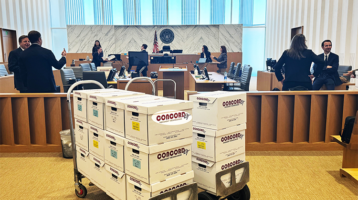Ask CONCORD DT on how we can save your client money. (800) 246-7881
Judges Offer Candid Advice on E-Discovery at Leadership Summit
Monica Bay, Law Technology News
The fourth annual Electronic Discovery Institute Leadership Summit kicked off this morning with the third annual Judges’ Forum—aka the “Derek Jeter Tour” for Magistrate Judge John Facciola, of the U.S. District Court for the District of Columbia.
The summit, held at the Ritz-Carlton hotel in Fort Lauderdale, Fla., from Oct. 15-17, targets corporate counsel, and is expected to draw more than 250 attendees. (Some are still arriving due to inclement weather in the region.)
Moderator John Barkett, a Miami-based partner at Shook, Hardy & Bacon, reminded the audience that Facciola has announced his retirement (effective in January). The other panelists on the 100-minute panel included Judge Paul Grimm, of the U.S District Court for the District of Maryland; Magistrate Judge Elizabeth Schwabedissen, of 11th Judicial Circuit Court of Florida; Magistrate Judge David Waxse, of the U.S. District Court for the District of Kansas.
This year’s topic was “Emerging Issues and Ethical Perspectives from the Bench.” Most of the discussion addressed the pending amendments to the Federal Rules of Civil Procedure that are expected to be approved and go live in December, 2015.
Barkett started the discussion by reminding the audience that about 15 million law suits are filed every year in the U.S. Yet few lawyers and litigants effectively handle electronically stored information, and that contributes to the high costs of litigation.
Barkett gave Facciola the first at bat. “I’m afraid the rich are getting richer and the poor are getting poorer,” said Facciola, who also bemoaned that a huge segment of lawyers are not learning and/or using legal technology that can reduce costs and make litigation affordable. “This is a brand new world; a sea change,” he said. “Now lawyers must bring to the task a specific level of knowledge [about technology].”
Waxse was slightly more optimistic, saying that he sees a mix—”some are staying on top of technology, but still a lot of lawyers don’t,” he observed. “Some lawyers are still making deals to use paper (for discovery).”
But there is a bright side. “We are seeing dramatic changes in education and in the ways law schools are approaching [e-discovery], said Facciola, who cited the use of clinical experiences and other law school options. (See, for example, the new programs announced this week at the Benjamin N. Cardozo School of Law.)
Grimm outlined some of the steps he takes to address the ESI gap. For starters, he meets with counsel at the beginning of every case, and he also has discovery orders.
But he, like his peers, remains baffled by the lack of tech engagement by attorneys. “Aside from graffiti on buildings and the occasional handwritten note, everything is digital these days. Yet lawyers aren’t recognizing it,” Grimm said. “There is a less-than-optimal appreciation among lawyers and judges (about technology in litigation).”
Judges, however, do have some ammunition, Waxse advised. “Judges have obligations as well as lawyers—and a duty to report lawyers who are incompetent,” he said. “The judiciary needs to be more cognizant about our obligations.” Sometimes, Waxse said, involving higher-ups can escalate the situation and get the lawyers’ attention and action.
Lawyers will often claim that conducting e-discovery with proper technology will be too taxing, but they will get little sympathy. “Please don’t walk into the court and say it is burdensome. We know it is burdensome. Marriage is burdensome,” said Facciola.
“Be honest and upfront about costs,” urged Waxse.
Schwabedissen said the federal courts have a huge advantage over state courts. Florida courts have resisted changes and don’t have the benefit of the federal rules. One tactic she suggests is to “take your hearing off the motion calendar and make a special appointment (with the judge). Any party can trigger a case management conference.” She pleaded for help, asking the audience to encourage “think tanks, academia” and other organizations to “please don’t forget the state courts. Outreach is very thin.”
“Less than 2 percent of our jury cases can afford to go to trial,” she said.
Grimm noted the irony that even some of the pending rules won’t solve all the problems. In to many situations, it comes down to “the notion of ‘How much justice can you afford.” That, he said, underscores a problem.
The panelists urged the audience to be cognizant about proportionality. Spending $5 million on e-discovery for a case valued at $1 million simply doesn’t work, he said.
“We can never lose sight that if we continue [high costs] we will drive people out of the court,” warned Facciola.
But Waxse cautioned that proportionality is not always a panacea. “I’ve never seen proportionality effectively used,” he said. “If I could figure out what the value of the case is without evidence, I could probably settle the case.”
On the topic of sanctions, the judges reinforced that all the fear may be misplaced. “Sanctions are out there but not nearly to the extent that most lawyers fear the,” said Waxse. “Though sanctions are rare, they scare the living daylights out of lawyers.”
The best tactic is quick honesty, he argued. “Be transparent about what you have done or not done. If something happens, confess to it and offer to fix it. Don’t cover it up.”
“The chance of being sanctioned is like the chance of getting struck by lightning,” Facciola said.
Ask CONCORD DT on how we can save your client money. (800) 246-7881
Error: Contact form not found.


